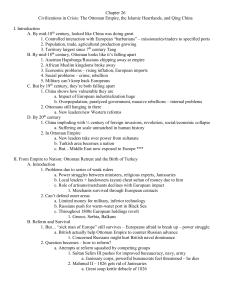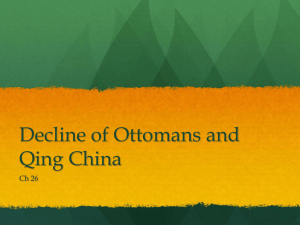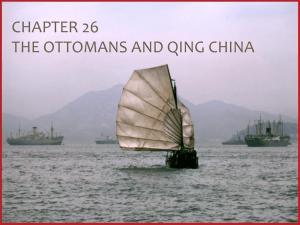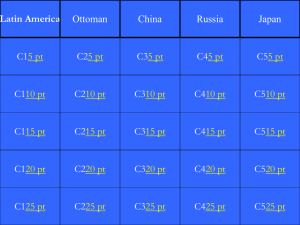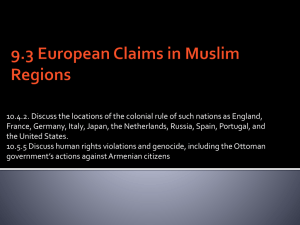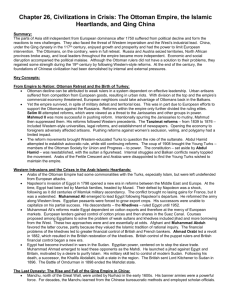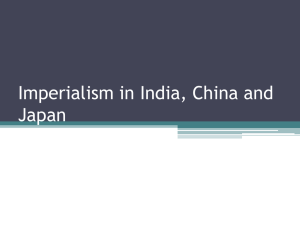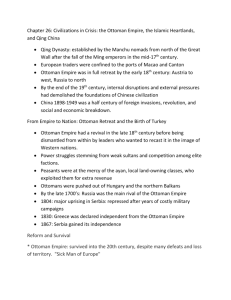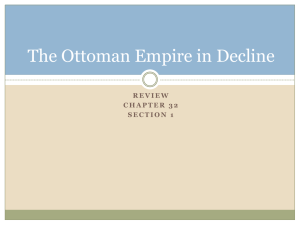outline - chapter 26
advertisement
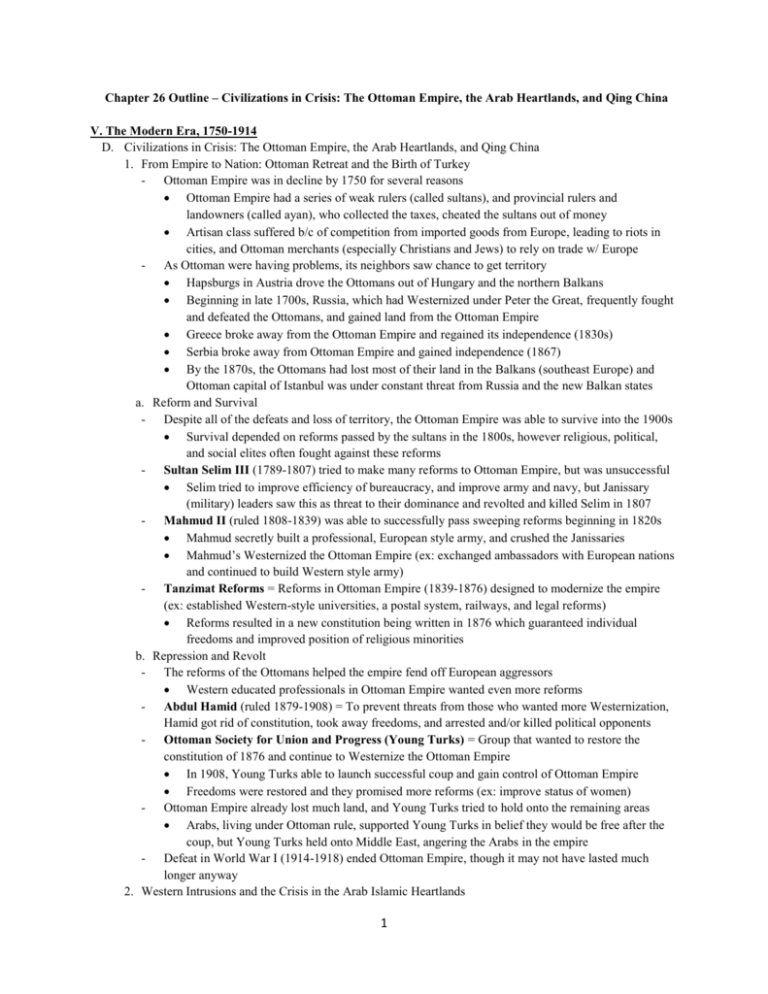
Chapter 26 Outline – Civilizations in Crisis: The Ottoman Empire, the Arab Heartlands, and Qing China V. The Modern Era, 1750-1914 D. Civilizations in Crisis: The Ottoman Empire, the Arab Heartlands, and Qing China 1. From Empire to Nation: Ottoman Retreat and the Birth of Turkey - Ottoman Empire was in decline by 1750 for several reasons Ottoman Empire had a series of weak rulers (called sultans), and provincial rulers and landowners (called ayan), who collected the taxes, cheated the sultans out of money Artisan class suffered b/c of competition from imported goods from Europe, leading to riots in cities, and Ottoman merchants (especially Christians and Jews) to rely on trade w/ Europe - As Ottoman were having problems, its neighbors saw chance to get territory Hapsburgs in Austria drove the Ottomans out of Hungary and the northern Balkans Beginning in late 1700s, Russia, which had Westernized under Peter the Great, frequently fought and defeated the Ottomans, and gained land from the Ottoman Empire Greece broke away from the Ottoman Empire and regained its independence (1830s) Serbia broke away from Ottoman Empire and gained independence (1867) By the 1870s, the Ottomans had lost most of their land in the Balkans (southeast Europe) and Ottoman capital of Istanbul was under constant threat from Russia and the new Balkan states a. Reform and Survival - Despite all of the defeats and loss of territory, the Ottoman Empire was able to survive into the 1900s Survival depended on reforms passed by the sultans in the 1800s, however religious, political, and social elites often fought against these reforms - Sultan Selim III (1789-1807) tried to make many reforms to Ottoman Empire, but was unsuccessful Selim tried to improve efficiency of bureaucracy, and improve army and navy, but Janissary (military) leaders saw this as threat to their dominance and revolted and killed Selim in 1807 - Mahmud II (ruled 1808-1839) was able to successfully pass sweeping reforms beginning in 1820s Mahmud secretly built a professional, European style army, and crushed the Janissaries Mahmud’s Westernized the Ottoman Empire (ex: exchanged ambassadors with European nations and continued to build Western style army) - Tanzimat Reforms = Reforms in Ottoman Empire (1839-1876) designed to modernize the empire (ex: established Western-style universities, a postal system, railways, and legal reforms) Reforms resulted in a new constitution being written in 1876 which guaranteed individual freedoms and improved position of religious minorities b. Repression and Revolt - The reforms of the Ottomans helped the empire fend off European aggressors Western educated professionals in Ottoman Empire wanted even more reforms - Abdul Hamid (ruled 1879-1908) = To prevent threats from those who wanted more Westernization, Hamid got rid of constitution, took away freedoms, and arrested and/or killed political opponents - Ottoman Society for Union and Progress (Young Turks) = Group that wanted to restore the constitution of 1876 and continue to Westernize the Ottoman Empire In 1908, Young Turks able to launch successful coup and gain control of Ottoman Empire Freedoms were restored and they promised more reforms (ex: improve status of women) - Ottoman Empire already lost much land, and Young Turks tried to hold onto the remaining areas Arabs, living under Ottoman rule, supported Young Turks in belief they would be free after the coup, but Young Turks held onto Middle East, angering the Arabs in the empire - Defeat in World War I (1914-1918) ended Ottoman Empire, though it may not have lasted much longer anyway 2. Western Intrusions and the Crisis in the Arab Islamic Heartlands 1 a. Muhammad Ali and the Failure of Westernization in Egypt - By 1750, Europeans were started conquering Muslim areas around the world, and Napoleon’s invasion of Egypt in 1798 signaled the Europeans may soon get the Islamic heartlands (Middle East) The Mamluks, who controlled Egypt, did not think the Europeans posed a serious threat, but Napoleon’s armies quickly destroyed them, scaring the Islamic world since Mamluks supposed to be one of strongest of the Islamic armies Only reason Egypt was spared was b/c the British navy fought and drove out the French - Muhammad Ali = Won a power struggle after Napoleon’s retreat to become leader of Egypt Ali quickly Westernized the Egyptian army, and made it the most powerful in the region - Muhammad Ali’s attempts at reform in Egypt mostly failed Tried to improve education and industrialize Egypt, but both measures failed Muhammad Ali tried to expand Egypt and make it rival its Ottoman rulers, which wasted time and money that could have been used to make his reforms successful Ali forcibly took peasants produce to pay for army made Egypt even poorer In 1848, Ali died, and his successors (called khedives) intermarried w/ the Turks and ruled Egypt b. Bankruptcy, European Intervention, and Strategies of Resistance - Muhammad Ali’s successors did little to help improve Egyptian society While cotton production expanded, and landowners grew wealthy, most peasants went hungry Growing cotton at expense of other food crops left Egypt dependent on a single export, and thus vulnerable to price fluctuations from Europe - Khedives (rulers) wasted money on luxuries for the palace, and had to borrow money from Europeans Suez Canal (1869) = Connected Mediterranean and Rea Seas; became vital commercial and military link between Europeans and their colonies in Asia and East Africa - Muslims differed on how to stop the increasing control of Europeans over Egypt Religious scholars thought only way to stop Europeans was through jihad (holy war) and returning to strict religious observance Others thought Muslim world must modernize and borrow science and technology from the West To this day, this disagreement plagues the Muslim world - As khedives (Egyptian rulers) debts to Europeans increased, Europeans gained more control of Egypt In order to put down a rebellion led by an Egyptian army officer, Ahmad Orabi, in the 1880s, the khedives had to turn to Britain for help The British stopped the rebellion, but as a result basically became rulers of Egypt (it was not technically a colony, but Britain dominated Egypt and the Egyptian leaders were puppet leaders) This was beginning of Great Britain dominating the Islamic heartlands c. Jihad: The Mahdist Revolt in the Sudan - Sudan, (south of Egypt) was ruled by Egypt, but Sudanese began rebelling against Egyptian rule Sudanese opposed Egyptian rule, which they viewed as corrupt The Egyptians heavily taxed the Sudanese people Egypt (with prodding from Great Britain) attempted to end the slave trade in the 1870s, which angered Muslims merchants in Sudan who relied on slave trade economically - Mahdist Revolt = Led by Muhammad Achmad, the Sudanese rebelled against Egyptian rule Mahdis viewed Egyptians as practicing diluted form of Islam, full of Western (British) influence Mahdis were very successful, and within a few years gained control of all of Sudan Mahdis built a strong state, with a closely controlled society – no smoking, no dancing, no alcohol, crime was severely punished, foreigners were expelled, and the slave trade returned In 1896, the British sent General Kitchener to crush the Mahdis, which he did d. Retreat and Anxiety: Islam Imperiled 2 - By the end of the 1800s, it was clear the Islamic world was too far behind Europe technologically, and that Islamic civilization was in great peril 3. The Last Dynasty: The Rise and Fall of the Qing Empire in China - The Manchus, who lived north of the Great Wall, quickly and unexpectedly took over China in 1644 Manchus were mostly nomads, and they were under the rule of the Chinese Banner Armies = eight armies of the different Manchu tribes who united to conquer China - The Ming Dynasty was weak and in decline, which allowed the Manchus to take control of China Chinese allowed the Manchus through the Great Wall in order to help put down a rebellion, but once inside, the Manchus staged their own rebellion, and quickly toppled the Ming Dynasty - The Manchus ruled as the Qing Dynasty, they proved to be very capable leaders of China The Manchus built huge army and expanded China to its largest size since Tang Dynasty in 600s - Manchus kept the political system that the Ming Dynasty had used in place, including allowing the scholar-gentry to retain their power The Manchus kept the exam system and educated their own sons in the Chinese classics a. Economy and Society in the Early Centuries of Qing Rule - Manchus didn’t just preserve political system, tried to preserve society as a whole Reinforced Confucian value system (ex: old over young, male over female) - Women remained confined to the household Families still preferred having boys (women’s family had to pay dowry for marriage) Many killed female babies (infanticide), and there were more males in China than females Lower class women could work in the fields and sell produce at local markets Unlike India, widows were allowed to remarry (b/c widows considered burden to family) - Manchus tried helping rural peasants (lowered taxes and labor demands, repaired dikes, canals, and roadways, and they tried to reduce power of landlords over the tenant farmers) Attempts to help rural peasants mostly failed, largely because population had become so large and there was a limited amount of farmland available for them Instead, landowners got wealthy at tenants expense, and gap b/t rich and poor in rural areas grew - The sector of society which Qing rulers mostly left alone was the merchants Qing Dynasty ended restrictions and allowed Chinese merchants to go overseas China got rich getting silver in return for exports of tea, porcelain, and silk Compradors = wealthy new group of Chinese merchants that emerged under Qing Dynasty b. Rot from Within: Bureaucratic Breakdown and Social Disintegration - By late 1700s, the Qing Dynasty was in decline Exam system had become corrupt - cheating and bribery became common Revenue and tax money was diverted to enrich individual families Funds needed for army fell off sharply Spending on public works, such as dikes, was greatly reduced - Food shortages and excess demands by landlord led to large numbers of Chinese forced to migrate Beggars crowded the streets and banditry became a major problem in many areas c. Barbarians at the Southern Gates: The Opium War and After - The European threat to China in the mid-1800s was greater than any threat China had faced earlier - The British imported Chinese goods, but Chinese didn’t want British goods, only silver in return British merchants unhappy about unfavorable balance of trade, but found that opium, which was grown in India (which the British had as a colony), was in high demand in China - The Chinese soon realized the opium traffic was a major threat to their economy and social order Chinese used silver they had gotten to buy opium, and the favorable balance of trade was gone 3 - d. - - - e. - - f. - Opium was destroying Chinese society - so much money spent getting opium, and so many Chinese became addicts, and needed work was not getting done By early 1800s, Chinese officials realized they needed to stop opium trade When Europeans did not agree to stop opium trade, the Chinese blockaded European trading areas in China and destroyed all of the European opium stashes Opium War (1839-1842) = War between Britain and China that began after the Chinese refused to stop their anti-opium campaign; China was soundly defeated, and as a result China was forced to open trade and diplomatic relations with European nations After Opium War, Hong Kong was established as British trading center Chinese ports opened, and Europeans got land in China to build warehouses and living quarters, and by mid-1800s, Chinese overseas trade was overseen by the British A Civilization at Risk: Rebellion and Failed Reforms China’s defeat in the Opium War greatly contributed to a growing threat to Chinese civilization Taiping Rebellion = Loss in Opium War sparked massive rebellions in southern China in the 1850s and 1860s that nearly toppled the Qing Dynasty Taipings wanted major social changes - land redistribution, rights for women, attacked the Confucian elite, and pushed for simplified written script and mass literacy The fact the Taiping rebels went after the scholar-gentry was a main cause of their defeat Manchu provincial leaders united, rooted out corruption, and were able to survive the rebellion Self-Strengthening Movement = Manchu provincial leaders (scholar-gentry) united and successfully stopped the Taiping rebels by passing limited reforms, and Manchus kept in power These provincial leaders were getting stronger, and central Manchu rule was breaking down The Manchus resisted reforms that were needed to save Chinese civilization Scholar-gentry kept stopping reforms b/c didn’t want to lose their top status The last decades of Qing Dynasty were dominated by the ultraconservative dowager Empress Cixi Cixi crushed all attempt at reforms in order to maintain her authority In order to drive out Europeans, members Qing leaders backed secret rebellions against Europeans (ex: Boxer Rebellion (1898-1901) = Chinese attempt to drive out foreigners, which failed, leading to Europeans controlling China even more) The Fall of the Qing By the beginning of the 1900s, the Qing Dynasty’s days were numbered Many secret societies formed, and uprisings against the Manchus was common By 1900, sons of scholar-gentry and merchants were joining these secret societies and plotting to overthrow the regime (these were Western educated men who wanted to overthrow the Manchus and make China a modern nation patterned after the West) Despite the desire to Westernize, these reformers did not want foreign involvement in China Finally, in 1912, these reformers were able to overthrow the Ming Dynasty and establish a republic in China The End of a Civilization? In 1905, civil service exams were given for the last time in China The end of the exam system represented the potential end of Confucian philosophies in China, and a giant bureaucracy staffed by scholar-gentry began to be viewed in a negative light in China 4
